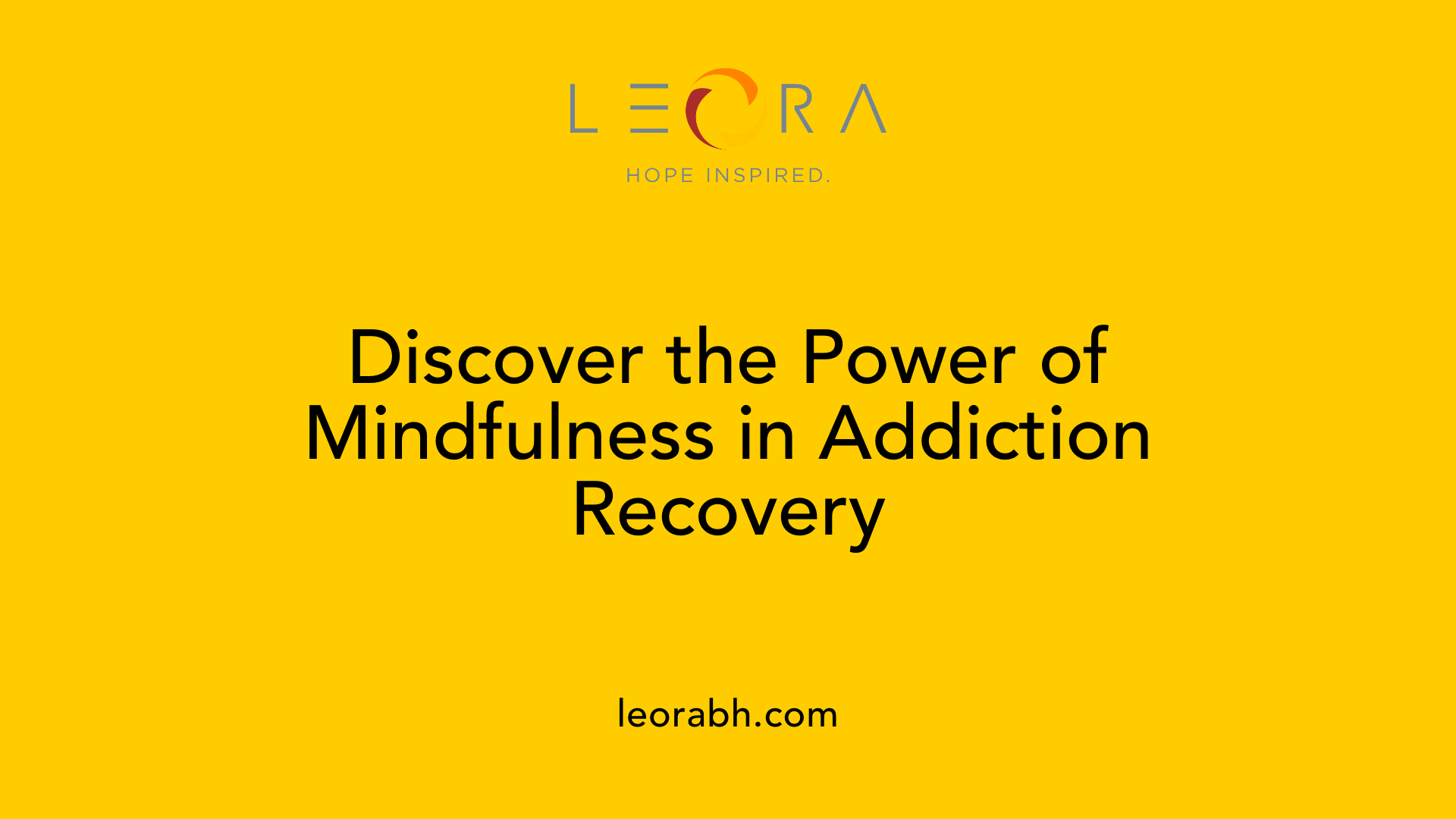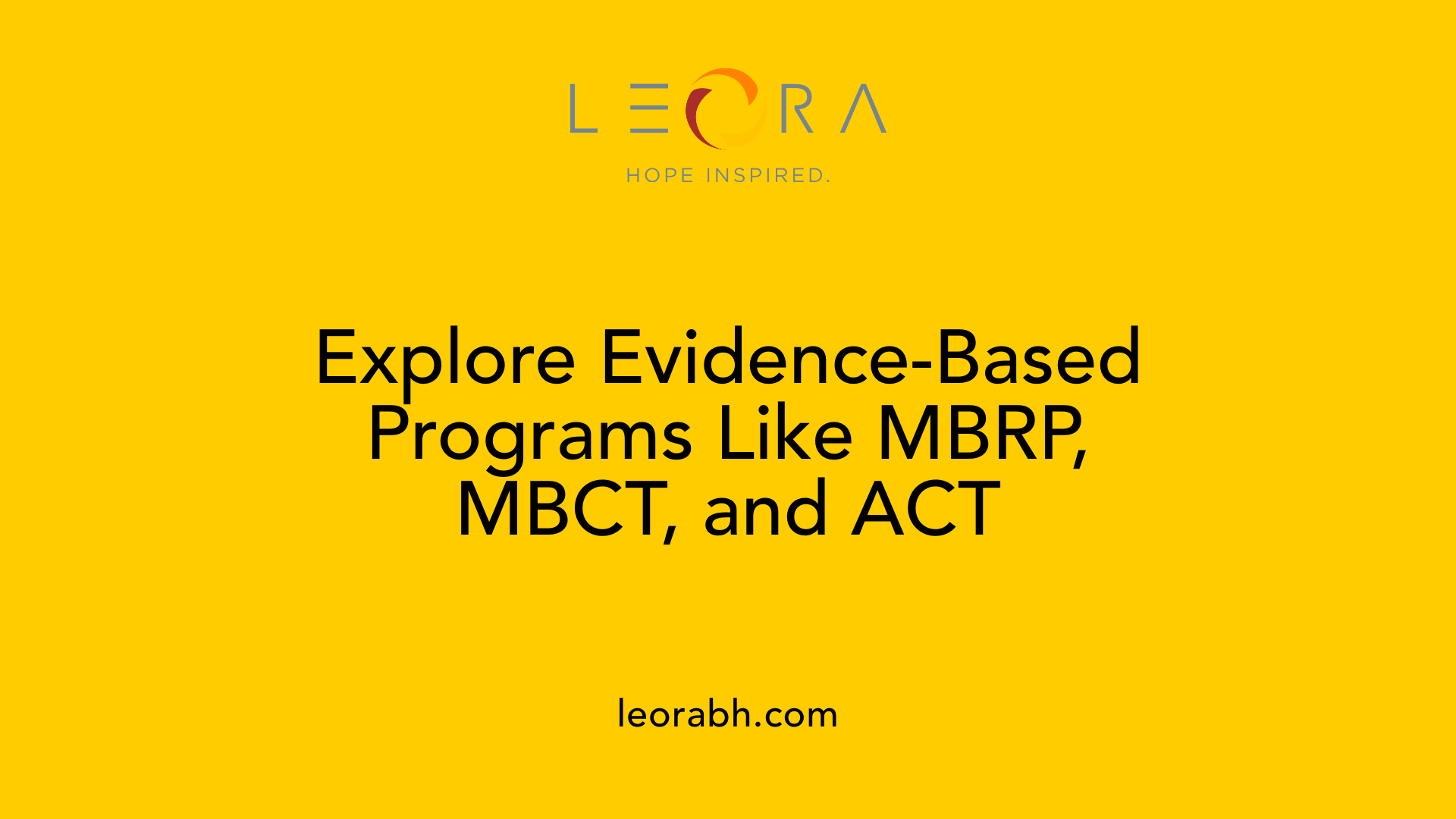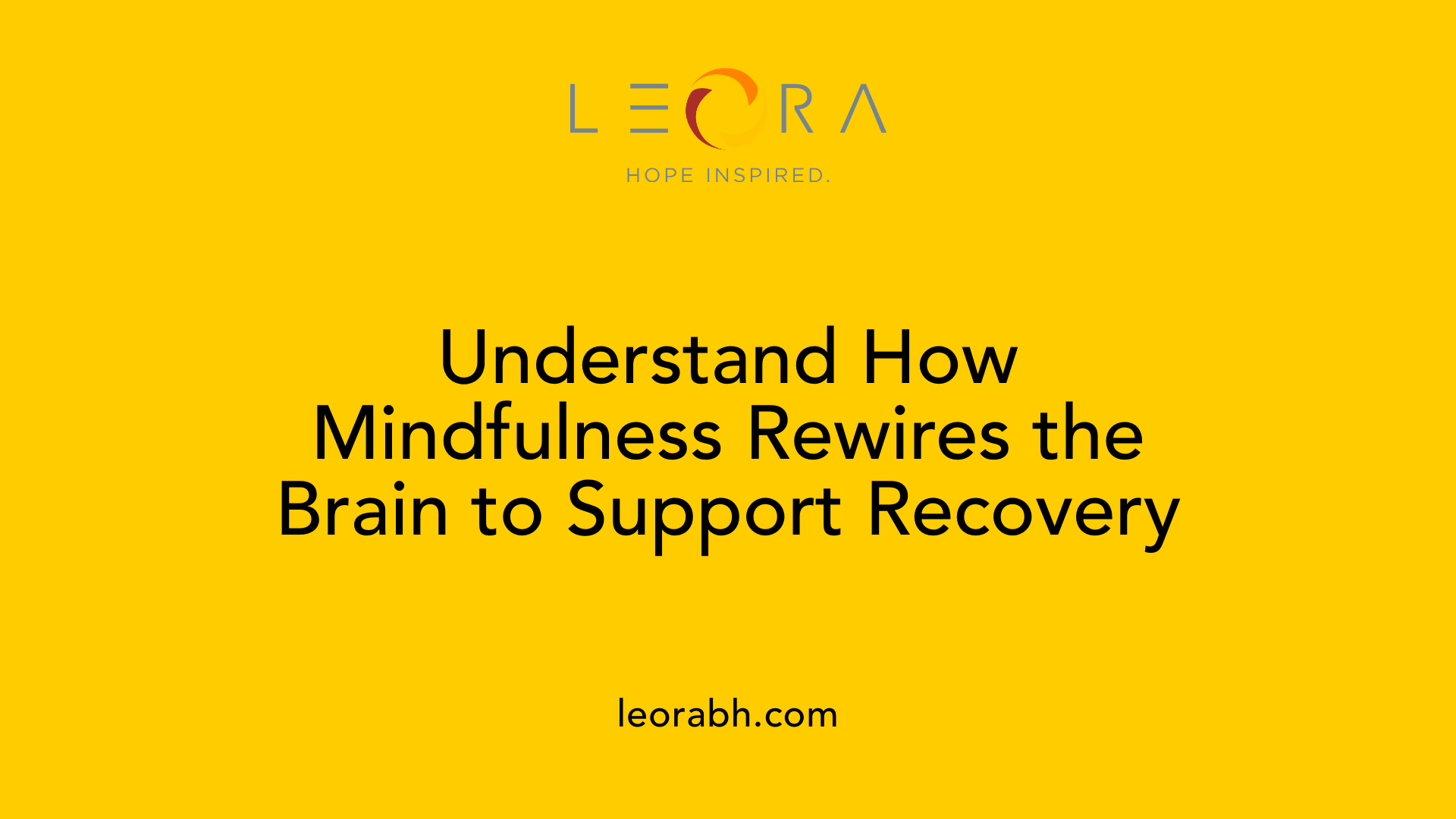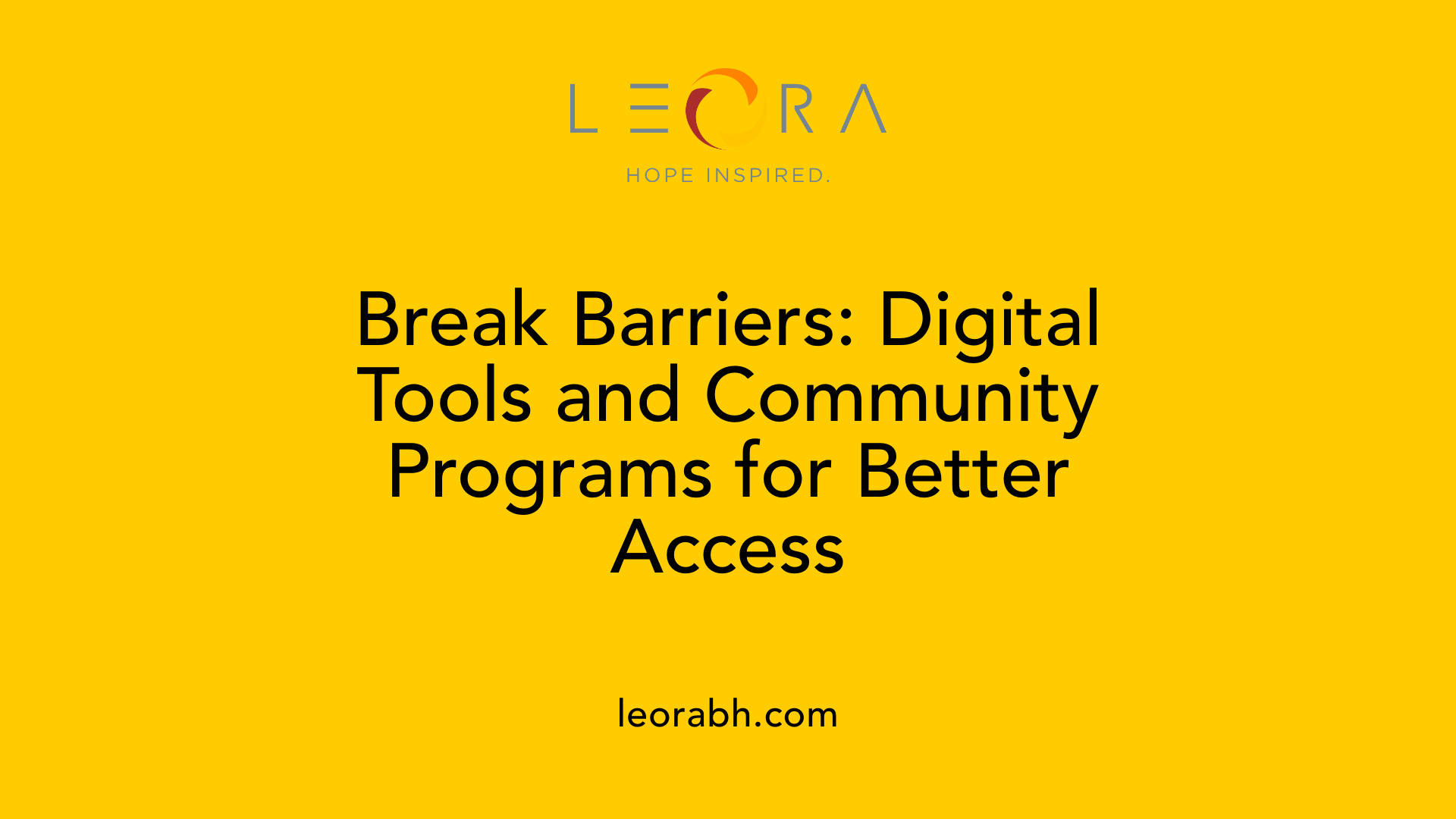Mindfulness practices to support outpatient addiction treatment
Unlocking Sobriety: The Power of Mindfulness in Outpatient Addiction Recovery
A Holistic Approach to Addiction Recovery
In recent years, mindfulness practices have gained recognition as a powerful tool to support individuals recovering from addiction. Integrated into outpatient treatment programs, mindfulness techniques help manage cravings, reduce stress, and foster emotional resilience. This article explores how mindfulness-based interventions enhance treatment outcomes, their scientific backing, and practical ways to incorporate these practices into daily recovery routines.
Understanding Mindfulness and Its Role in Addiction Recovery

What is mindfulness and what are its fundamental principles?
Mindfulness is the art of being fully present and aware of one's thoughts, emotions, bodily sensations, and surroundings without judgment. It rests on core principles of awareness and acceptance, encouraging individuals to observe their internal and external experiences with openness and curiosity. Mindfulness promotes living in the moment, cultivating clarity, and fostering a compassionate attitude toward oneself.
How does mindfulness enhance present-moment awareness and acceptance?
Through practices like mindful breathing, body scans, and mindful movement, individuals learn to anchor their attention to the here and now. This heightened awareness helps in recognizing bodily sensations, emotional states, and automatic thoughts as they occur. Acceptance involves gently embracing whatever arises—be it stress, cravings, or discomfort—without resistance or suppression. This fosters an open, non-reactive stance that can reduce emotional turbulence.
Why is mindfulness significant in managing stress and cravings during recovery?
During addiction recovery, stress and cravings are common triggers that can lead to relapse. Mindfulness helps individuals manage these triggers by decreasing stress reactivity, which is supported by neuroimaging studies showing reduced activity in the brain’s reward-related regions when practicing mindfulness. It also enhances emotional regulation, allowing individuals to observe cravings without immediately acting on them. By increasing self-awareness, mindfulness creates space between impulse and action, empowering individuals to choose healthier responses. Such practices have been shown to lower substance use and cravings, support relapse prevention, and improve overall treatment outcomes.
Additional insight on mindfulness techniques in recovery
Common strategies include mindful breathing, body scans, and mindful eating, which strengthen self-control and resilience. Multi-week group programs like Mindfulness-Based Relapse Prevention (MBRP) typically involve guided sessions focused on understanding and managing cravings, automatic habits, and emotional responses. These interventions structure neural pathways towards healthier decision-making and increase responsiveness to natural rewards, thus restructuring the brain's reward system. Overall, integrating mindfulness into addiction treatment provides practical tools to foster emotional stability, reduce stress and craving, and support long-term sobriety.
Types of Mindfulness-Based Interventions for Addiction

What are mindfulness-based interventions for addiction?
Mindfulness-Based Interventions (MBIs) consist of therapeutic programs that incorporate mindfulness meditation techniques to improve mental health and manage cravings. They focus on cultivating present-moment awareness, acceptance, and emotional regulation, which are crucial in reducing substance use and preventing relapse.
Overview of prominent interventions such as MBCT, MBSR, MBRP, and ACT
Several well-established MBIs are used in addiction treatment. These include:
| Intervention | Purpose | Main Techniques | Targeted Issues |
|---|---|---|---|
| Mindfulness-Based Cognitive Therapy (MBCT) | Prevents relapse in depression and addiction | Mindful breathing, body scan, cognitive exercises | Mood, cravings, automatic thoughts |
| Mindfulness-Based Stress Reduction (MBSR) | Reduces stress and anxiety | Meditation, gentle yoga, mindful awareness | Stress, emotional dysregulation |
| Mindfulness-Based Relapse Prevention (MBRP) | Addresses cravings and triggers | Mindful awareness of urges, acceptance strategies | Cravings, automatic behaviors |
| Acceptance and Commitment Therapy (ACT) | Enhances psychological flexibility | Mindfulness, values-based action | Emotional discomfort, temptation |
These interventions are tailored to modify cognitive, affective, and physiological responses linked to addictive behaviors.
Mult-week group formats and guided mindfulness practices
Most MBIs are structured as multi-week programs, typically spanning about 8 weeks. They are usually delivered in group formats, facilitating shared experiences and peer support.
Participants engage in guided mindfulness exercises such as:
- Mindful breathing
- Body scan meditation
- Walking meditation
- Loving-kindness meditation
These sessions help individuals develop skills to notice cravings and emotional triggers without reacting impulsively.
Tailoring interventions to address specific mechanisms underlying addiction
MBIs are specifically designed to target mechanisms like experiential avoidance, reward processing dysregulation, and stress reactivity. For instance:
- Strengthening top-down cognitive control to manage impulsivity.
- Restructuring neural reward pathways to favor natural reinforcers.
- Decreasing emotional reactivity that could lead to relapse.
Research shows these tailored approaches can effectively reduce substance misuse, cravings, and improve self-control.
| Intervention | Duration | Format | Focus | Outcomes |
|---|---|---|---|---|
| MBRP | 8 weeks | Group | Cravings, triggers | Reduced relapse rates |
| MBCT | 8 weeks | Group/Individual | Mood, automatic thoughts | Lower substance use |
| ACT | Variable | Group/Individual | Psychological flexibility | Decreased cravings |
| MORE | 8 weeks | Group | Reward processing | Increased natural reward sensitivity |
Incorporating these evidence-based mindfulness strategies into addiction treatment offers a holistic path to recovery, addressing both psychological and neurobiological factors.
Specific Mindfulness Practices in Outpatient Settings

How can mindfulness be practiced during recovery?
Practicing mindfulness during recovery involves engaging in various exercises that cultivate present-moment awareness and emotional regulation. Common activities include mindful breathing, where individuals focus on their breath to anchor attention and reduce stress. Body scans are also effective; they involve systematically paying close attention to different parts of the body, which helps increase bodily awareness and release tension.
Additionally, mindful movement practices such as yoga or tai chi encourage gentle, deliberate movements that keep the mind focused on physical sensations. Walking meditation combines movement with awareness of the environment and bodily sensations, promoting grounding and stress reduction. Guided imagery—where one visualizes calming scenes—can aid in managing cravings and emotional distress.
Incorporating holistic activities supports a balanced approach to recovery. Regular routines that include these practices foster resilience against triggers and cravings.
Incorporating yoga, walking meditation, and guided imagery
Yoga integrates mindful breathing with physical postures, enhancing flexibility, strength, and emotional calmness. Walking meditation helps individuals connect with their surroundings and stay present during daily walks, which enhances mindfulness outside formal practice sessions.
Guided imagery uses auditory cues to guide visualizations that promote relaxation and emotional relaxation. These techniques are often included in outpatient programs to help manage stress and cravings effectively.
Recommendations for establishing a regular mindfulness routine
To maximize benefits, establishing a consistent schedule is crucial. Starting with short daily sessions—such as 10 minutes of mindful breathing or body scan—can build momentum.
Creating a dedicated space for practice, free from distractions, encourages regular participation. Using guided recordings or apps can provide structure and variety.
Incorporating mindfulness into everyday activities like eating, commuting, or caring for pets transforms everyday moments into opportunities for self-awareness. Finding a community or support group can also motivate ongoing practice, providing accountability and shared experiences.
By maintaining a steady routine and integrating mindfulness into daily life, individuals can strengthen their emotional resilience, better manage stress, and support long-term recovery.
Neuroscientific Evidence Supporting Mindfulness in Addiction Treatment

How does mindfulness influence brain regions involved in addiction?
Mindfulness meditation has a significant impact on several key brain regions related to addiction, including the prefrontal cortex, amygdala, and cingulate cortex.
The prefrontal cortex, responsible for decision-making and self-control, shows increased activity and gray matter density with regular mindfulness practice. This enhancement strengthens executive functions, aiding individuals in resisting cravings and making healthier choices.
The amygdala, involved in processing emotions and stress, often exhibits reduced reactivity through mindfulness exercises. Lower amygdala activation correlates with decreased stress levels and emotional overwhelm, which are common relapse triggers.
The cingulate cortex, which plays a role in emotional regulation and awareness, also benefits from mindfulness, supporting better integration of cognitive and emotional processes. This is crucial for managing addiction-related urges and maintaining sobriety.
What is neuroplasticity and how is it linked to changes from ongoing practice?
Neuroplasticity refers to the brain’s ability to reorganize itself by forming new neural connections throughout life. Regular mindfulness meditation induces neuroplastic changes, positively remodeling neural networks involved in attention, emotion regulation, and reward.
Studies using neuroimaging techniques like MRI have documented increases in gray matter in areas associated with self-control and cognitive flexibility. These structural changes underpin lasting behavioral and psychological improvements, making recovery more sustainable.
How does mindfulness affect reward processing and craving?
Mindfulness influences the brain’s reward system by normalizing dopamine function. It reduces hyperactivity in reward-related areas such as the ventral striatum during craving episodes, decreasing the intensity of substance-related urges.
Furthermore, mindfulness practice enhances positive responses to natural rewards like social connection or physical activity. This shift from drug-associated pleasures to healthier sources of satisfaction supports long-term abstinence.
By cultivating present-moment awareness and acceptance, mindfulness helps individuals observe cravings without automatic reaction. This reduces cue-reactivity and the likelihood of relapse, fostering emotional resilience and self-regulation.
| Brain Region | Effect of Mindfulness | Implication for Addiction Treatment |
|---|---|---|
| Prefrontal Cortex | Increased activity and gray matter density | Improves decision-making, impulse control, self-regulation |
| Amygdala | Decreased reactivity | Reduces stress, emotional triggers for relapse |
| Cingulate Cortex | Enhanced emotional regulation | Aids in managing emotional responses to cravings |
Why might mindfulness help someone who is recovering from an addiction?
Mindfulness meditation helps recoverers by targeting neurocognitive mechanisms such as reward learning and executive functioning, often dysregulated in substance use disorders.
It enhances cognitive control over automatic habits, reduces cravings and cuereactivity, and restructures reward processing to prioritize natural, healthy rewards over drug-related ones. Additionally, mindfulness decreases stress reactivity by influencing the amygdala, promoting emotional regulation and inner equilibrium.
These practices improve awareness of high-risk situations and bolster self-regulation, allowing individuals to recognize triggers and respond more adaptively. Such skills diminish impulsive behaviors that lead to relapse.
By fostering emotional resilience and self-awareness, mindfulness empowers individuals to break the automaticity of their addictive behaviors. These insights and tools support long-term recovery and emotional well-being.
Overall, the neuroplastic changes induced by mindfulness practices underpin behavioral improvements and serve as a foundation for sustained sobriety within comprehensive addiction treatment programs.
Mechanisms and Benefits of Mindfulness in Relapse Prevention
Why might mindfulness meditation practices help someone who is recovering from an addiction?
Mindfulness meditation supports recovery from addiction by addressing several underlying neurocognitive processes involved in substance use disorders. It enhances executive functions such as response inhibition and decision-making, which are often impaired by addiction. Regular mindfulness practice strengthens the prefrontal cortex, the brain area responsible for self-control and regulating impulses. This leads to better management of automatic behaviors and reduces the likelihood of relapse.
Neurobiologically, mindfulness fosters increased connectivity between the prefrontal regulatory circuits and limbic reward systems. This restructuring of reward processing makes natural, healthy rewards more salient, counteracting the hedonic dysregulation caused by drugs. Brain regions like the amygdala, involved in stress and emotional responses, become less reactive, helping to reduce stress reactivity and emotional distress that could trigger substance use.
Physiologically, mindfulness enhances stress resilience by increasing heart rate variability (HRV) and calming the nervous system. These changes contribute to a calmer, more balanced emotional state, decreasing vulnerability to cravings and relapse during stressful situations.
Psychologically, mindfulness cultivates emotional regulation, fostering acceptance and reducing negative emotions like anxiety and depression. This emotional stability supports long-term sobriety by decreasing reliance on substances as coping mechanisms. Additionally, mindfulness increases self-awareness, enabling individuals to recognize early warning signs of relapse and respond proactively.
Overall, these neural, physiological, and psychological benefits combine to make mindfulness an effective tool in relapse prevention. It equips individuals with practical skills to manage cravings, handle stress, and respond adaptively to emotional challenges, enhancing their chances of sustained recovery.
| Mechanism | Impact | Neurobiological/Physiological Basis |
|---|---|---|
| Executive function enhancement | Better impulse control and decision-making | Strengthening of prefrontal cortex activity |
| Reward restructuring | Increased responsiveness to natural rewards | Restructuring of reward pathways in the brain |
| Stress regulation | Reduced stress reactivity | Increased heart rate variability, calming the nervous system |
| Emotional regulation | Reduced negative affect and cravings | Decreased amygdala activation |
| Self-awareness | Early detection of triggers | Enhanced neural connectivity in self-monitoring circuits |
By targeting these mechanisms, mindfulness practices provide a comprehensive approach that supports recovery, reduces cravings, and helps individuals maintain sobriety over the long term.
Integrating Mindfulness into Outpatient Addiction Programs
How can mindfulness be practiced during recovery?
Practicing mindfulness during recovery involves engaging in simple, yet effective activities that foster present-moment awareness. Techniques such as focusing on your breath, performing a body scan to notice physical sensations, and moving mindfully—like walking slowly or performing gentle yoga—are common practices. These activities help individuals stay connected to the present and reduce automatic reactions to cravings or emotional distress.
Additional holistic approaches can enhance mindfulness, including guided imagery, biofeedback, and mindful movement exercises. Creating a daily routine that incorporates self-care activities like regular exercise, caring for pets, or engaging in relaxing hobbies can promote emotional stability.
Seeking support from structured treatment programs is crucial. Behavioral therapies such as Cognitive Behavioral Therapy (CBT), which integrate mindfulness principles, reinforce awareness and self-regulation. Support groups like 12-step programs or mindfulness-based relapse prevention groups provide community and accountability.
Resources such as the SAMHSA helpline, online treatment locators, or trained mental health professionals can connect individuals to ongoing guidance. These combined efforts foster a sustainable mindfulness practice that supports recovery and reduces the risk of relapse.
Combining mindfulness with cognitive-behavioral therapy and other evidence-based treatments
Integrating mindfulness techniques into existing treatment frameworks like CBT enhances their effectiveness in managing addiction. Mindfulness helps patients recognize triggers and habitual thought patterns, making therapeutic interventions more impactful. When combined with evidence-based approaches such as Acceptance and Commitment Therapy (ACT), Dialectical Behavior Therapy (DBT), or Mindfulness-Based Relapse Prevention (MBRP), mindfulness strengthens emotional regulation, impulse control, and resilience.
These integrations often include group sessions, individual coaching, or both. They are typically delivered over multiple weeks—around 8—to establish consistent practice and behavioral change. Clinicians are trained to teach mindfulness skills, including mindful breathing, body scans, and acceptance strategies, tailored to address specific challenges like cravings or stress.
Group and individual delivery formats
Mindfulness-based programs are usually provided in group settings, making them accessible and fostering peer support. Group formats encourage shared experiences, normalizing struggles, and promoting mutual encouragement.
However, individual sessions are also beneficial, offering personalized guidance to address unique emotional and psychological triggers. Individual training enables clinicians to adapt mindfulness practices to specific needs—such as co-occurring disorders or high-stress environments.
In both formats, participants learn guided mindfulness exercises, journal reflections, and challenge-resistant strategies, empowering them to incorporate these skills into daily life.
Training of clinicians and staff in mindfulness techniques
Successful integration depends on properly trained staff. Clinicians and support personnel need comprehensive training in mindfulness principles and therapeutic techniques. This training includes understanding meditation practices, guiding mindfulness exercises, and managing participant engagement.
Certified programs and workshops are often used to educate staff, ensuring they are competent in teaching mindfulness and incorporating it into broader treatment plans. Ongoing supervision and continuous education help maintain high-quality delivery and adaptation as new research emerges.
Addressing challenges such as misconceptions and access to trained professionals
Despite its benefits, several challenges hinder full integration. Misconceptions about mindfulness, such as viewing it as passive or religious, can cause reluctance among patients or staff. Educational efforts are necessary to clarify that mindfulness is an active skill-based practice grounded in neuroscience.
Access to trained professionals remains limited in some regions, posing a barrier to widespread implementation. Efforts to expand training programs, utilize telehealth platforms, and develop online resources can bridge this gap. Promoting awareness and understanding of mindfulness's scientific basis further supports acceptance and application.
Efforts to overcome these challenges are essential for making mindfulness a standard component of outpatient addiction treatment, ultimately helping more individuals achieve sustained recovery.
Overcoming Challenges and Promoting Access to Mindfulness in Outpatient Settings

What are common misconceptions about mindfulness being passive or complex?
Many people mistakenly believe that mindfulness is a passive activity that requires little effort or engagement. However, mindfulness involves active participation, such as focused attention on the breath or bodily sensations, and cultivating a non-judgmental awareness of one's thoughts and feelings. Some also see mindfulness as too complex or demanding, leading to hesitation in adopting the practice. In reality, beginners can start with simple techniques like mindful breathing or body scans, which are easy to learn and implement. Clarifying these misconceptions helps more individuals feel confident in exploring mindfulness as a valuable tool in their recovery journey.
Why is there a need for trained professionals and ongoing training?
Effective implementation of mindfulness-based interventions (MBIs) depends on properly trained professionals who understand both the techniques and the underlying therapeutic principles. Trained facilitators can tailor mindfulness exercises to individual needs, address cultural sensibilities, and ensure correct practice. Ongoing training for clinicians is essential to keep up with the latest research and best practices, which enhances treatment outcomes. Without proper guidance, participants may struggle with inconsistencies or misinterpretations that could diminish the effectiveness of mindfulness in addiction recovery.
What strategies can increase accessibility, including digital and community-based programs?
To broaden access to mindfulness practices, especially in outpatient settings, innovative strategies like digital platforms and community programs are crucial. Mobile apps and online courses offer guided meditations, tutorials, and group sessions accessible anytime and anywhere. Community-based programs—such as workshops in local centers, peer-led groups, and collaborations with community organizations—bring mindfulness into familiar, supportive environments. These approaches reduce barriers like transportation costs, time constraints, and lack of local resources, making mindfulness more available to diverse populations.
How can we address cultural and individual differences in mindfulness practice?
Mindfulness is a universal concept, but its expression can vary across cultures and individual preferences. To ensure inclusivity, programs should adapt practices to respect cultural beliefs and languages, incorporating culturally relevant symbols or mindfulness techniques. Providing options like movement-based mindfulness (yoga or tai chi) or guided imagery can suit varied preferences. Facilitators should foster an open, non-judgmental environment that encourages participants to personalize their practice, helping them integrate mindfulness comfortably into their lives.
| Aspect | Approach | Additional Details |
|---|---|---|
| Misconceptions | Clarify that mindfulness is active and accessible | Use simple explanations and beginner-friendly exercises |
| Professional training | Invest in ongoing education for facilitators | Ensure certification and cultural competence |
| Accessibility strategies | Use digital tools and community outreach | Offer free or low-cost programs in local settings |
| Cultural adaptation | Customize practices for diverse backgrounds | Respect cultural norms and individual preferences |
Understanding and addressing these challenges can significantly enhance the implementation of mindfulness practices in outpatient addiction treatment, supporting sustained recovery and well-being.
Conclusion: Embracing Mindfulness for Lasting Change
Why might mindfulness meditation practices help someone who is recovering from an addiction?
Mindfulness meditation offers significant benefits for individuals recovering from addiction by addressing underlying neurocognitive processes involved in craving, self-control, and reward. These practices help strengthen the prefrontal cortex, which is responsible for decision-making and impulse control, while calming brain regions like the amygdala that are associated with stress and emotional reactivity.
Through regular mindfulness exercises—such as mindful breathing, body scans, and meditation—people can learn to recognize high-risk cues and emotional triggers early, reducing automatic reactions that often lead to relapse. Mindfulness also helps restructure the brain’s reward system, increasing responsiveness to natural, healthy rewards instead of drug-related stimuli.
Research indicates that mindfulness reduces stress reactivity and emotional turbulence, key factors that can sabotage recovery efforts. It promotes emotional regulation, resilience, and inner calm—making it easier to manage cravings, resolve emotional distress, and stay committed to sobriety.
In addition, mindfulness encourages awareness and acceptance of thoughts and feelings without judgment, empowering individuals to tolerate discomfort during withdrawal and challenging situations.
By targeting neurocognitive mechanisms such as reward learning and executive functioning, mindfulness enables individuals to de-automatize habits, break cycles of automatic substance use, and develop healthier responses to stress and cravings. This comprehensive approach not only supports immediate recovery but also fosters long-term sobriety, emotional well-being, and overall resilience.
Fostering a Future of Resilience and Sobriety
Incorporating mindfulness practices into outpatient addiction treatment offers a comprehensive and scientifically supported pathway to long-term sobriety. These practices empower individuals to develop greater emotional regulation, reduce stress, and foster self-awareness, all of which are critical for navigating the challenges of recovery. As research continues to validate the neurobiological and psychological benefits of mindfulness, treatment centers that integrate these techniques are better equipped to support sustained behavioral change. Embracing mindfulness as a core component of outpatient programs not only enhances immediate treatment outcomes but also cultivates resilience, inner peace, and a fulfilled life beyond addiction.
References
- Mindfulness-Based Therapies for Substance Use Disorders
- Mindfulness-based treatment of addiction: current state of the field ...
- Mindfulness meditation in the treatment of substance use disorders ...
- Meditation For Addiction Recovery: Types & How To Start
- Northern California Mindfulness Meditation and Addiction Recovery
- Using Mindfulness and Meditation in Addiction Treatment | Arrowwood
- What Is Mindfulness-Based Outpatient Drug Treatment?
Find Your Inner Light
Related Articles
Schedule an Assessment
Leora Behavioral Health provides comprehensive treatment services, including ambulatory detox, mental health IOP, and SUD IOP, to support your journey toward lasting recovery.
Our caring team will guide you through the admissions process and create a personalized treatment plan tailored to your unique needs. We welcome walk-ins. If you or a loved one is struggling, reach out today. We’re here to help.


.svg)




.svg)
.svg)
.svg)
.svg)
